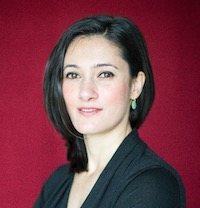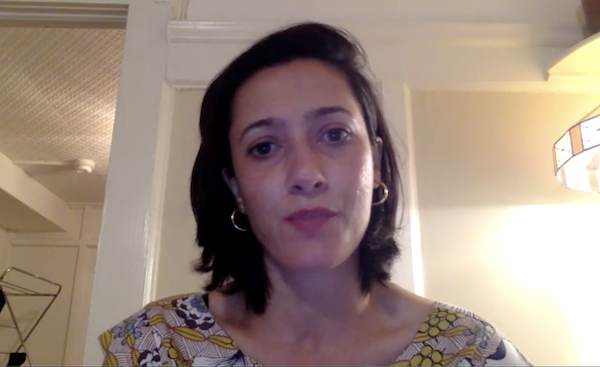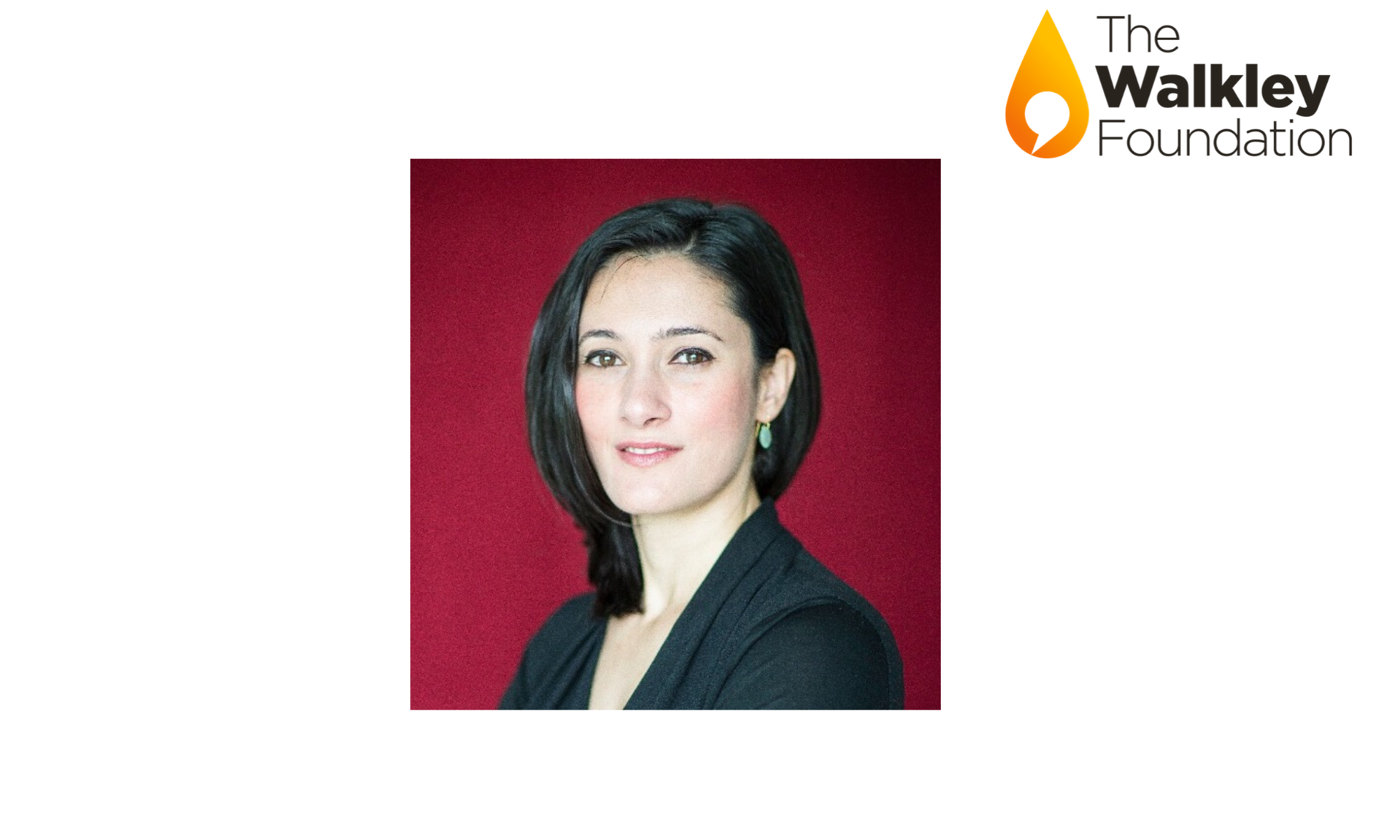2020 winner of the June Andrews Awards for Freelancer of the Year, supported by Media Super
“We churn out some of the most intrepid, fearless reporters in the world [but] the sad part is some of Australia’s best journalists are making waves overseas. Australian media to some extent is facing a brain drain…because there is no space for them, particularly those from diverse backgrounds”
 An Emmy and Peabody-nominated journalist, and the winner of both the 2018 and 2020 Freelancer of the Year Awards, Karishma Vyas has almost 20 years of experience covering international news for media networks, including Al Jazeera, the ABC and Channel 4 news.
An Emmy and Peabody-nominated journalist, and the winner of both the 2018 and 2020 Freelancer of the Year Awards, Karishma Vyas has almost 20 years of experience covering international news for media networks, including Al Jazeera, the ABC and Channel 4 news.
The 2020 June Andrews Award for Freelancer of the Year recognised Vyas’ exceptional work for 101 East – Al Jazeera English and Foreign Correspondent, ABC “The War on Afghan Women,” “Afghanistan: The Healers” and “Behind Enemy Lines“.
“This was brilliant storytelling in two countries – Afghanistan and America,” the Walkley Judges said. “Vyas managed to access some of the most sensitive areas of Afghan society, bringing to the screen extraordinary people doing extraordinary things.
“Her films were compassionate and thoughtful but also hard-hitting. Her despatch from New York was jaw-dropping, not only for the access to the people deeply involved in combating the COVID-19 crisis, but also in the way she allowed those characters to chronicle the dreadful chaos of New York’s response to the coronavirus outbreak.”
After her win, the Walkleys spoke with Vyas over Zoom from her New York base about the importance of trust and personal relationships when working in dangerous areas, covering COVID-19 in the middle of New York’s pandemic peak, and why Australia is facing a brain drain of talented journalists from culturally diverse backgrounds.
Congratulations, first of all, on winning the Freelancer of the Year award again. How does it feel to have your work recognised with this award for a second time?
Thank you, it’s been a strange year. There’s been a lot of anxiety as a freelancer working in this environment, especially in the US with the COVID situation. One of the most fundamental things we do as a reporter is embed ourselves in communities, and we do pride ourselves on hitting the ground, doing our interviews, doing our research, and something simple like that has become very dangerous. So it is a timely reminder that the work that we do is important, and we still have to keep doing that, but with greater precautions.
“[COVID] is a timely reminder that the work that we do is important, and we still have to keep doing that, but with greater precautions”
One of the stories that you were awarded for was reporting from New York in the midst of the pandemic. What was that like being on the ground?
I look back on it now and even though it was just a couple of months ago, it feels like a lifetime because the COVID story has moved so quickly. We filmed the story in the initial stages of the US response to it and at that time, not only was New York going through the very peak of its infection rates and [its] health crisis, but also it was at a time where we still didn’t know very much about COVID, so we didn’t really have a great level of guidance, or tried and tested strategies on how we could report on this story safely.
We were dealing with people that were at the highest risk of infection, and therefore at the highest risk of infecting us. We just didn’t know if the precautions we were taking were going to be enough to protect us from infection. And it was this kind of ever-present threat that flowed throughout our work process.
We really didn’t know whether we were infected until about two weeks after we finished filming, during which time the cameraman and I were both in quarantine. We had to play this waiting game to find out whether we ourselves were infected. So it was something that I’ve never experienced before, that level of stress in the job.
The winning stories that you shot in Afghanistan, how did those develop?
I’ve been covering Afghanistan for 13 years now, since 2007. I first started covering it as a video journalist for AFP News Agency as the South Asia video correspondent, so I know my way around the country. But the thing about Afghanistan is the security situation is so fluid that even as somebody that has been covering it for a long time, you can never be complacent.
Every time you go there, you start from square one. I’m very lucky. Over the years I have met and become friends with many people who I rely on 100% to keep me safe, and keep the entire crew safe.
In terms of having access, that was all built just through meeting people, building a rapport with them before we start filming. That’s all very important. In my stories, I never go in just guns blazing with the camera.
“If you want to make people trust you, you have to earn that trust… do the legwork and the groundwork, the research, the drinking 1000 cups of tea and listening to their stories to get that trust. There’s no shortcut to it.”
If you want to make people trust you, you have to earn that trust. And you have to do the legwork and the groundwork, the research, the drinking 1000 cups of tea and listening to their stories to get that trust. I have found being a woman in that country greatly advantageous. Because men don’t see you as a threat, women instinctively trust you because that’s the culture. The community that exists there, women have a very close bond with each other.

Over the many years that you’ve been shooting in sometimes dangerous or unstable areas, what are some of the most important things that you’ve picked up that have helped you to shoot great stories, and also stay safe?
I’ve learnt to rely on other people, to be honest. Because when you go to dangerous countries, you have to just accept that you are totally at the mercy of the people and the circumstances around you. So being a woman is not going to save you. Being an Australian is not going to save you. Being a foreigner is not going to save you. The only thing that’s going to save you are the people that you surround yourself with. And you have to be very selective, very careful about who you work with, because your life is very much in their hands.
But even in terms of a story, you have to work with people that you trust to give you the context of what you’re seeing and the story that you’re covering. You cannot know the hundreds of years of history and the ins and outs, the nuances of a country, so you have to be willing to listen to people. You can’t just go in as a Western reporter with the arrogance that you know everything that’s happening, just because you’ve Googled the country. You have to be willing to put aside your assumptions and go in with the mindset to learn. I’m always flabbergasted that the more I know about a country and an issue, the more I realise how little I know. The deeper you dig the more you realise how little you actually know. And I think reporters have to go in with that humility.
This is your second Freelancer of the Year award – have you seen the market for freelance journalists change significantly in that time?
In America right now, I see a great level of discussion about people of colour, and how few opportunities there have been for people of colour to tell their stories, to provide that diversity in what’s available out there.
“In Australia I didn’t see people like me on television. I didn’t see myself reflected, you know? And what astonishes me and saddens me is that every year I go back to Australia and I still don’t see that”
I do not see the same happening in Australia, and I think that is Australia’s loss, quite frankly. One of the major reasons I left Australia is because I didn’t see people like me on television. I didn’t see myself reflected, you know? And what astonishes me and saddens me is that every year I go back to Australia to see my family and I switch on the TV, and I still don’t see that.

We should not be here right now. Australian media is failing its audience. And it’s doing it at its own detriment, because once you alienate your audience, who do you expect to watch you? Who do you expect to read you? Job losses are happening left, right and centre in Australia, and audiences are abandoning Australian media because their interests, their perspective, their culture, their background is not being reflected.
“Audiences are abandoning Australian media because their interests, their perspective, their culture, their background is not being reflected.”
Australian media needs to fight for its audience. We have too many options now. We can go somewhere else, we don’t have to rely on Australian content to reflect our interests and our needs and our culture. So if Australian media wants to stay relevant, wants to keep its audience, it better pull up its socks.
The sad part is some of Australia’s best journalists are making waves overseas. Australian media to some extent is facing a brain drain, the training we get as Australian reporters is second to none. We churn out some of the most intrepid, some of the most fearless reporters in the world.
“We churn out some of the most intrepid, fearless reporters in the world [but] the sad part is some of Australia’s best journalists are making waves overseas. Australian media to some extent is facing a brain drain…because there is no space for them, particularly those from diverse backgrounds”
But because there is no space for them, particularly those from diverse backgrounds, [they’ll] find a place overseas. I would like to see us find a home in Australia so we don’t have to travel halfway around the world to find the opportunities that our own country should be giving us.
Just before we wrap up, is there anything else that you’d like to add? Anyone that you’d like to give a shout out to or give thanks to?
Television is always, always a team sport — I think any journalism is. Without people agreeing to speak to you, without people agreeing to blow the whistle on wrongdoing, without people willing to let you into their homes, and their hearts, and their tragedies, journalists would be nowhere. We are entirely dependent on other people to do our job.
And I’m very grateful for the men and women that often risk their lives to speak to me. Also, it takes a small army to do television. You work with cameramen, with editors, with executive producers who guide you through every step of the process. So even though it’s often the reporter that picks up the award, I think people need to understand there is a small army behind all of us.
Al Jazeera has been a huge supporter of mine. They let me do my first documentary. They have allowed me to do many, many documentaries since then. Foreign Correspondent put their faith in me to cover one of the biggest stories in the world with the COVID crisis. So there is just an endless list of people I should thank.
Read the winner announcement here.
Karishma Vyas is an Emmy and Peabody-nominated journalist, and the winner of both the 2018 and 2020 Freelancer of the Year Awards. She has almost 20 years of experience covering international news for media networks, including Al Jazeera, the ABC and Channel 4 news.
Watch interviews with the winners of the 2020 Mid-Year Celebration of Journalism
The June Andrews Award for Freelancer of the Year is supported by Media Super



